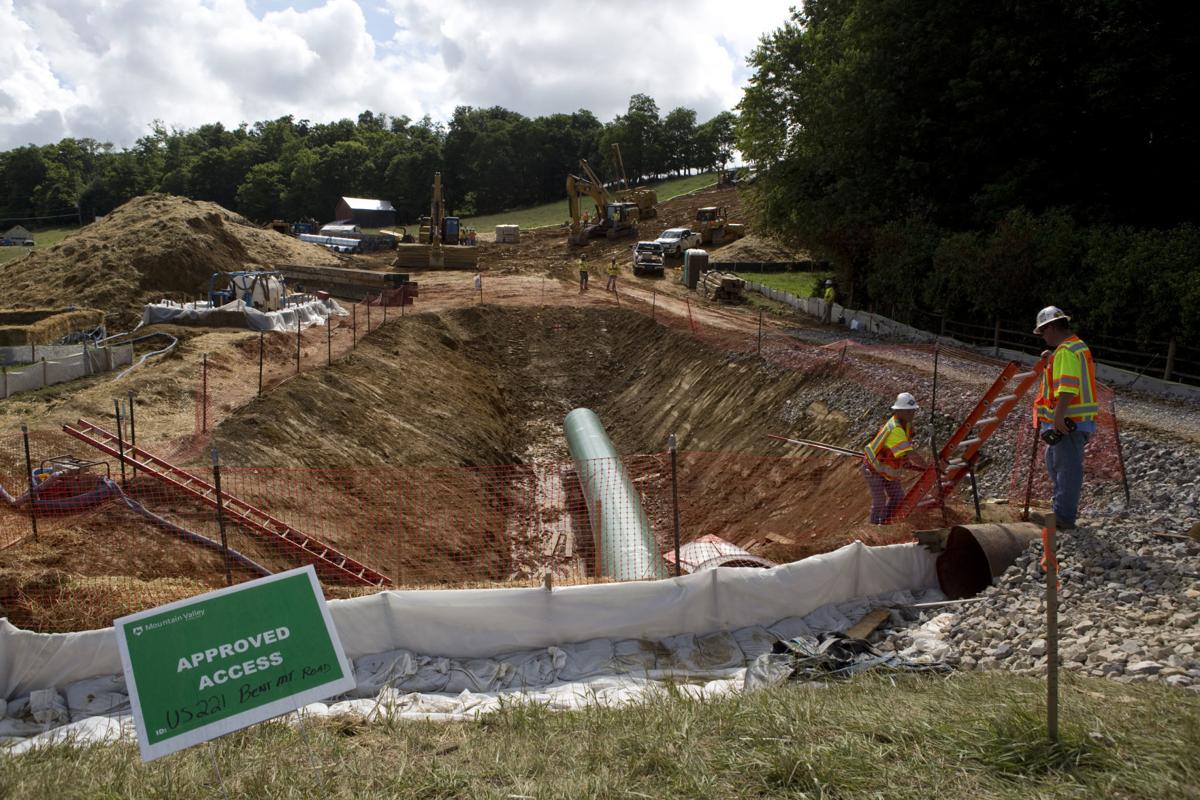
In this June 22 file photo, construction crews prepare to bore beneath U.S. 221 on Bent Mountain in Roanoke County to make a tunnel through which the Mountain Valley Pipeline will pass under the highway.
Construction of the Mountain Valley Pipeline will continue into 2019, longer than expected and sometimes with 15-hour workdays that are irking its neighbors.
Shareholders of NextEra Energy, one of the pipeline’s developers, were told Wednesday that an anticipated completion date of late this year is no longer viable for the massive natural gas pipeline.
Work on the pipeline “has faced some recent challenges,” John Ketchum, executive vice president and chief financial officer of NextEra Energy, said during a quarterly earnings conference call. He cited a stay issued by a federal appeals court that put a hold on stream crossings the buried pipeline must make in West Virginia.
If the stay is lifted soon, “we believe there will only be a slight delay to the in-service date for the pipeline to the first quarter of 2019,” according to a transcript of Ketchum’s remarks posted to NextEra’s website.
Also this week, the Federal Energy Regulatory Commission allowed Mountain Valley, a coalition of five energy companies that is building the pipeline, to adjust its work schedule to cover every available minute of daylight.
In a variance request, Mountain Valley said it was not asking to extend its work hours, which FERC generally limits from dawn to dusk.
Under a clarified and more detailed schedule, for example, work on Thursday can begin at 5:50 a.m. and continue until 9:01 p.m.
Critics, including several local governments, say allowing construction to start before 7 a.m. and continue past 7 p.m. will subject nearby residents to more noise and other inconveniences.
“Many people residing along the pipeline route are either sleeping or resting during these extended times or may be outside enjoying the now quite warm summer nights,” Montgomery County Attorney Martin McMahon wrote in a letter to FERC in opposition of the extended hours.
A California law firm representing Roanoke County raised concerns that the longer workdays would violate the county’s noise ordinance, while acknowledging that such local restrictions are trumped by the Natural Gas Act, a federal law that allows the pipeline to be built.
For Lynda Majors, who lives about 200 feet from where the pipeline will cross through Montgomery County, the extra work hours are but the latest injustice for landowners opposed to a corporate venture that has been forced upon them.
“MVP’s reputation with the public is already extremely low,” Majors wrote in a July 12 letter to FERC. “They would be ill-advised to add another insult to injury by increasing their construction noise and disruption beyond the limits of an already long 12-hour work day.”
Asked Wednesday if she was surprised that FERC had granted MVP’s request, Majors responded: “Absolutely not. It’s certainly pipelines over people.”
“We’re giving up our land and our water,” she said, “and now we’re expected to give up our lives because there’s no rest from the beep, beep, beep” and other sounds of heavy equipment being used to clear land and dig trenches for the pipeline.
Longer hours could pose more than just an inconvenience, according to more than a dozen letters submitted to FERC in recent weeks.
The letter-writers raised the possibility of accidents caused by worker fatigue, health risks to nearby landowners, additional burdens for first-responders, and the inability of safety and environmental regulators to conduct adequate inspections.
When the workday finally ends, “speeding trucks after dark, driven by tired workers constitutes an even greater recipe for disaster,” Dr. Tina Smusz of Catawba wrote in her letter.
A spokesperson for Mountain Valley had no comment Wednesday.
In a letter dated Tuesday, FERC’s deputy environmental project manager informed the company that while it had previous authorization for daytime construction, any work outside of that time frame would require additional consideration.
Around-the-clock work is allowed for time-sensitive activities, such as drilling operations to lay the pipeline under waterways and railroads.
Even though construction is now running behind schedule, NextEra shareholders were assured Wednesday that the company’s energy holdings will not be impacted.
Ketchum also said during the conference call that the company hopes a stay issued by 4th U.S. Circuit Court of Appeals soon will be lifted.
Last month, the Richmond-based appeals court temporarily delayed a permit issued by the U.S. Army Corps of Engineers, which Mountain Valley needed before it could start running the 42-inch diameter pipeline across the bottoms of streams and rivers in West Virginia.
Conservation groups that sought the stay argued that the permit was deficient because it allowed the crossing of four rivers even though the work cannot be completed within the 72 hours required by the state’s environmental regulators.
They also say that flaws with the permit in West Virginia, where the 303-mile pipeline will originate, are serious enough to invalidate a second Army Corps approval that covers nearly 500 streams and wetlands along the pipeline’s route through Southwest Virginia to its terminus in Pittsylvania County.
The Army Corps has since modified the West Virginia permit in a way that should satisfy the court, Ketchum said.
In explaining the delay in the pipeline’s completion date, Ketchum made no mention of protesters who have sat in trees and chained themselves to construction equipment in an effort to block a project they say will despoil the pristine land and water of Southwest Virginia.












Đăng nhận xét